Rebuilding Independence: Bishnu and Fattha’s Resilience After Earthquake and Disability Stigma
Published on: June 8, 2017

Bishnu and Fattha are sisters, both contracted polio as children. There are 10 years between them in age, and while they both suffer from the same disability, Bishnu’s disability is significantly more severe than Fattha’s. Both women use a wheelchair, however the severity of Bishnu’s condition means she also has trouble using her arms, so tasks like washing herself and feeding herself are essentially impossible.
Bishnu and Fattha are very familiar with the extreme stigma that is associated with disability in Nepal. When their parents became aware of their disabilities as children they believed they were bad luck and refused to take care of them. The two girls were taken in by distant relatives and had no choice but to grow up in separate homes.
As adults, the two women have been reunited and in 2014 they managed to build a small house in the district of Gorkha where they lived together and created a small shop selling food and household items. The profits from the business were just enough for them to survive on, and they were happy to be self-sufficient.
In April 2015, less than a year after they had established their new home and business, the 7.8 magnitude earthquake hit, with Gorka being the worst affected area in the country. Bishnu and Fattha’s small home and shop were completed destroyed, as well as all of the contents.
Since then, they have been living below the poverty line. Without a home, source of income or support from their parents, they are riddled with anxiety and stress about what their future will hold.
When CIL-Kathmandu heard about Bishnu and Fattha they invited them to come to Kathmandu to take part in the Independent Living Program. CIL-Kathmandu provided them each with customised wheelchairs suitable for the rough terrain in Gorka, and they underwent peer counselling, medical check-ups and were educated on their human rights and potential support services available to them.
“These have been the best days of my life” says Bishnu. “Here, I am not the only person who is disabled, and I can see many people with disabilities living independently. I now feel like I can live my own way, and will try again to run my business” she says.
Fattha explains how participating in the Independent Living Program has affected her outlook on life, “my mood has changed and I am now motivated to succeed in my business and live independently” she says.
